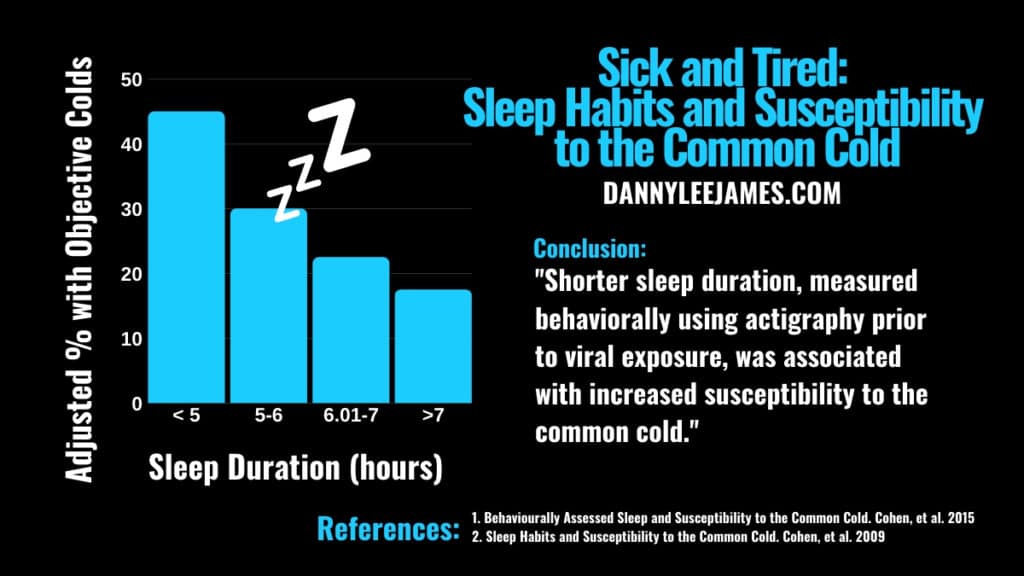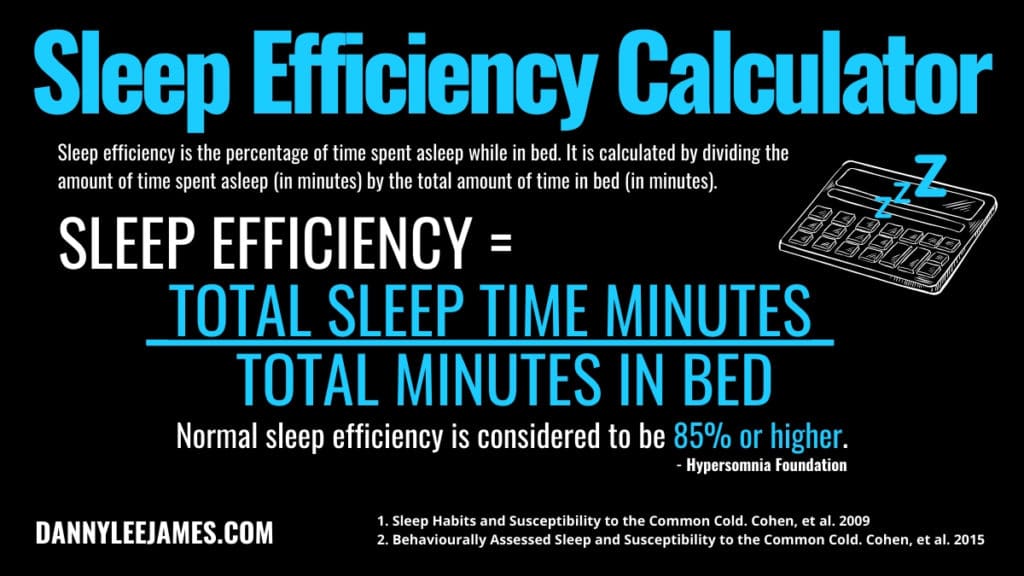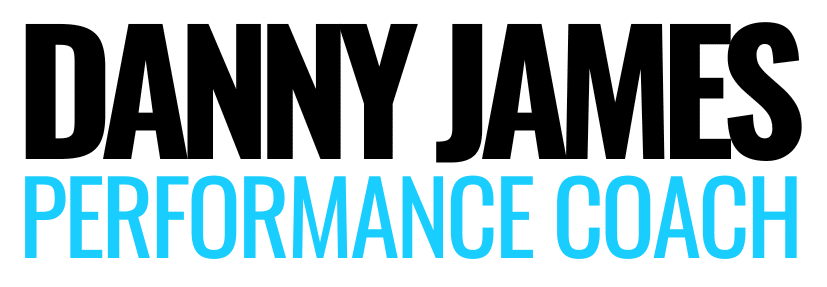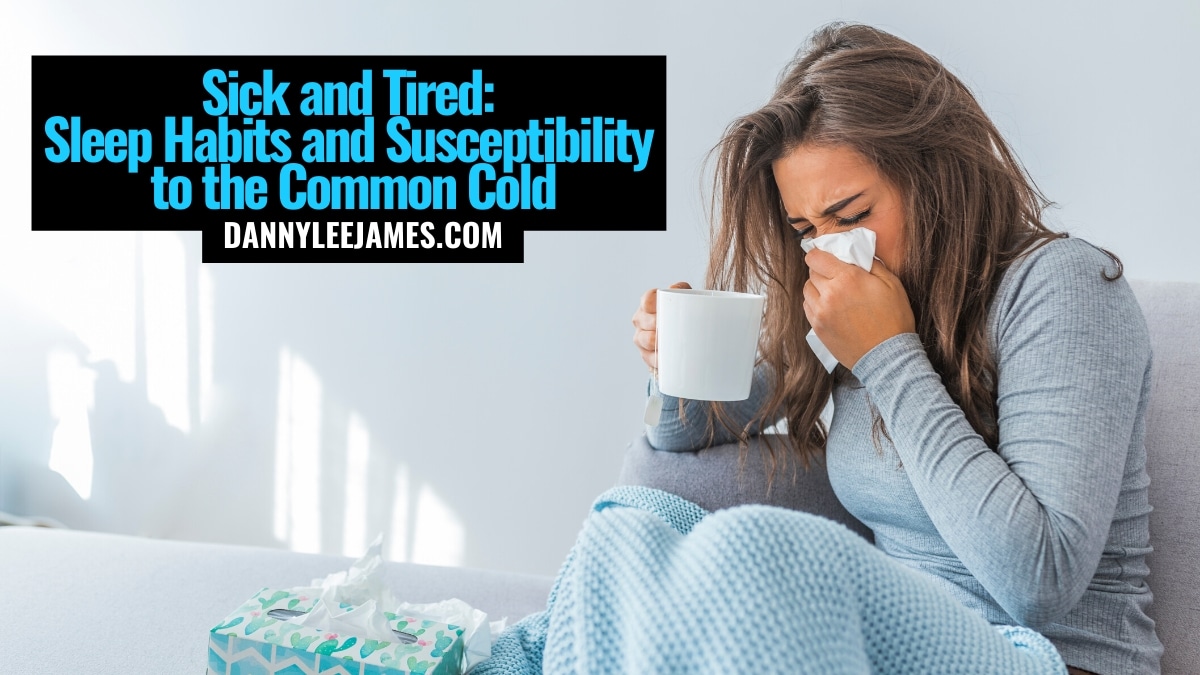Did you know that if you get less than 7 hours of sleep each night, you are 2.94 times more likely to catch a common cold
Sounds like most people we know, right?
That’s what a fascinating 2009 study found (1).
Sleep and Susceptibility to the Common Cold
153 healthy men and women volunteered over a 14 days period, reporting daily on their sleep duration and efficiency (the percentage of time in bed actually asleep) of the night before.
Please, scroll to the bottom for the sleep efficiency calculator.
They calculated average scores for each sleep variable across the fortnight baseline.
Now, bear with me. This is where it gets interesting.
Participants then received a dose of rhinovirus and monitored for a period after.
Now, this wasn’t like the special boost-juice you’d get in your Weetbix at a Russian Olympic Training Centre.
Nope.
They administered volunteers with a full-blown infection and observed them for signs of the development of a clinical cold.
Needless to say, some people got sick.
The study revealed a graded association with those sleeping less and with poorer sleep efficiency more likely to get hit by the common cold.
Compared to those sleeping 8 hours or more, participants reporting less than 7 hours of sleep showed lower resistance to illness.
Controlling for a tonne of confounding variables, the study narrowed it right down.
Cohen et al found that independent of efficiency, sleep duration did not predict illness.
Sleep efficiency, however, was an independent and stronger correlate of susceptibility to the common cold.
Fast forward 6 years, same author, a new study, and a similar story.
A new study
Addressing the limitations of self-reported sleep, Cohen, et al went a different route. This time, they measured sleep behaviour using wrist actigraphy and a 7-day sleep diary (2).
Once again, volunteers received a good dose of rhinovirus and scientists looked on. They controlled again for a host of variables, including:
- Pre-challenge antibody levels
- Demographics
- Season of the year
- Body mass index
- Psychological variables
- Health practices
So, what happened?
Shorter sleep duration emerged as a strong predictor of illness susceptibility.
Essentially, the shorter the sleep the larger the risk

Now, think about it.
In this day and age, how many people do you think are getting more than 7 hours of sleep? Probably, not many. But, I know a lot of people that are quite often sick beneath the weight of some ailment or other. And, while the full depths and corridors that make up the phenomena of sleep are yet to be reached, we do know this much:
Sweet slumber – that nurturing milk of nature and all it’s restorative prowess and immunity are bidirectionally linked. Immune system arousal warps sleep and sleep in turn can bend immunity. Poor sleep renders the frontline of our body’s innate defence systems vulnerable. Open to microbial invasion.
It’s important to prioritise and prepare for sleep, as we would most things we want to improve.
We need to protect that which protects us.
Sleep Efficiency Calculator
Sleep efficiency is the percentage of time spent asleep while in bed. It is calculated by dividing the amount of time spent asleep (in minutes) by the total amount of time in bed (in minutes). Normal sleep efficiency is considered to be 85% or higher.
Source: Hypersomnia Foundation

References
- Sleep Habits and Susceptibility to the Common Cold. Cohen, et al. 2009
- Behaviourally Assessed Sleep and Susceptibility to the Common Cold. Cohen, et al. 2015


[…] Sleep at least 8 hours each night […]
[…] Sleep at least 8 hours each night […]